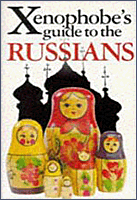






Contents:
 |
|||||
"Drinking is the joy of Russians. We cannot live without that pleasure," stated Grand Prince Vladimir of Kiev as early as A.D. 988. The Russians drink morning, noon and night. Many observers believe that Gorbachev's single greatest mistake, leading to his unpopularity among the Russian people and his eventual downfall, was caused by his unsuccessful campaign against the wholesale consumption of alcohol. It is rumoured that his own father was an alcoholic, which is not statistically unlikely. Business deals are sealed with a colossal binge and Russians only feel really comfortable with a man if they have got extremely drunk together.
Modern Russian intellectuals and bureaucrats do not drink themselves insensible on every occasion, but there is a severe alcoholism problem in the country. It is not unusual to see a man or (less usually) a woman slumped on the floor of the metro at any hour, or reeling frighteningly amid the traffic on one of the busy main roads. Bars on the street are mainly functional places with no chairs where men go to get drunk as fast and cheaply as possible.
Russian vodka comes in flavours such as pepper or lemon, as well as straight. It is drunk very, very cold from small glasses. For parties vodka bottles were traditionally encased in solid blocks of ice. The liquor should be so cold that it is almost viscous. A very Russian accompaniment to vodka is cheremsha, pungent stalks of pickled wild garlic. The Russian way of eating caviar is very simple - no messing about with hard boiled eggs or chopped onion. Spread some nice cold butter on a piece of white bread, then add caviar and wash down with a swig of vodka.
Russian tea is drunk without milk and usually comes with a little side dish of varenye. This looks like jam, perhaps a little thicker and with more fruit, and is eaten with a teaspoon while sipping your tea. The Russians adore tea and claim that it tastes best if it has not crossed water until the boiling water hits it - i.e. it has come overland from the Caucasus, the Crimea, India or China.
Eating out in Russia can be a test of character. First of all, you need to gain admittance to the restaurant. This is not as elementary as you may think. An American oilman and some friends made their way into one of Russia's new pizza restaurants in Moscow at lunchtime and asked politely for a table. "We're shut," said the waiter, surrounded by the clearest indications that they were not. "And in any case, the chef's tired."
Russians have taken to the Western-type fast food outlets with such enthusiasm that they have to queue for up to 40 minutes for a hamburger. In St.Petersburg, a chain of restaurants sells something in a bun called a "peterburger". The Russian word for "fast", bystro, which was exported to France by hungry Russian soldiery occupying Paris after the downfall of Napoleon, has been re-imported into Russia with the new French spelling "bistro".
The Russians are not one of nature's races of servants. Unlike say, the Italians, they do not find joy and pleasure in being of service. Russian literature is full of memorable servants who grumble whenever they are asked to do anything, steal from their masters and spend the day snoring on the sofa. One theory is that Russian waiters must be engaged in some top secret project and some day Western scientists will discover what it is. Meanwhile, one thing is certain - they are all far too busy doing whatever else it is they do to pay any but the most perfunctory attention, or to spare anything but the minimum of their kitchen supplies to restaurant guests. Some Russian restaurants, of course, are simply a place where the "mafia" (underworld criminals) can sit in the warmth and keep their ammunition dry. Customers are not welcome at these places either. Contrary to rumours, Russian food is delicious.
Breakfast is a big meal. It can include cottage cheese, pancakes (blinchiki or syrniki which are made with cottage cheese), jam, sliced cheese, cold ham, fried eggs, omelette or kasha (hot porridge usually made with buckwheat or semolina, milk and sugar, and eaten with lots of butter), sweet buns and ordinary bread, coffee, tea and juice. There is a great variety of Russian soured milk products, such as kefir (drinking consistency), smetana (sour cream), and most delicious of all, ryazhenka (soured milk baked in the oven to a golden brown colour.) Most households stock up from spring to autumn with homemade pickles, preserves and jams from fruit and vegetables collected wild or grown in the countryside such as mushrooms, tomatoes, apples, blueberries, blackberries, raspberries, crab apples, cranberries and rhubarb.
Lunch tends to be at about 2 o'clock, if at all. The concept of fast food, cafes and restaurants is catching on, but not fast enough to find somewhere to eat at midday on every street corner as in Paris or New York, so it is vital to stoke up at breakfast time.
Dinner can begin at around 6.30 p.m. At either lunch or dinner the traveller should beware of overdosing on the first course (zakuski), with its tempting array of smoked fish, caviar, meat, salad, pickled mushrooms, cucumbers and so on - all washed down with vodka. Next comes the soup, usually clear, made with vegetables, and maybe a piece of meat floating in it or dumplings. Then comes the main course, meat or fish, with potatoes or rice. Dessert is perfunctory, either ice-cream or compote (stewed fruit). Tea, rather than coffee, follows the meal. The Russians have a very sweet tooth and serve delicious chocolates and biscuits with tea mid-morning and in the afternoon. From one small Scottish firm alone they import four million chocolate bars a month.
2009 ╘ All rights reserved. Designed by TatkaCo: tania@email.it
